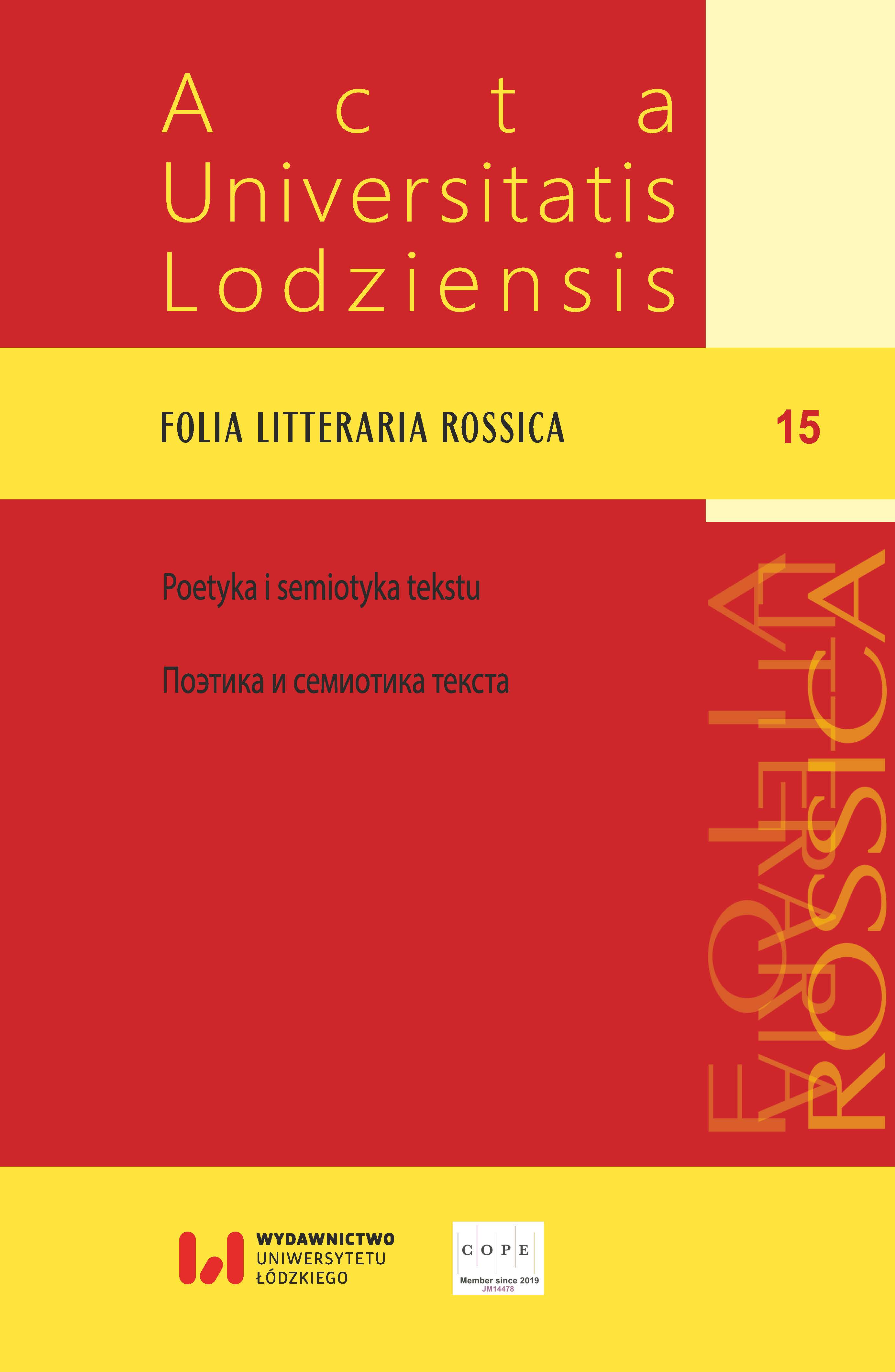Baroque Traits in Russian Neoclassicism: Mikhail Lomonosov, Gavriil Derzhavin, and Symeon of Polotsk
DOI:
https://doi.org/10.18778/1427-9681.15.21Keywords:
Baroque, Neoclassicism, literary tradition, Mikhail Lomonosov, Gavriil Derzhavin, Symeon of PolotskAbstract
In this article, I trace some effects produced by Baroque on the Russian poetry and question the traditional attitude to the cultural epoch as to somewhat occasional and uninfluential; a mere buffer between the traditional Old Russian art and Russian Neoclassicism introduced by Peter the Great’s reforms oriented towards new European norms. In contrast to the vision, I put an emphasis on the genuine, rhetoric nature of the Neoclassicism. Russia has never been a country of the classical antiquity; thus, Russian poets use classical motifs solely and exclusively as popular verbal cliches. Beneath the new formulas, poets continue the Russian literary tradition; Russian Neoclassicism is shaped by the Baroque. I compare works by Symeon of Polotsk, Mikail Lomonosov, and Gavriil Derzhavin in order to explore a poetic tradition manifested by a shared plot and a set of motifs. Influenced by Symeon of Polotsk, Russian Neoclassicism continues to use baroque elements. Namely, the protagonists of Lomonosov are sceptical about the capabilities of the human mind to interpret nature. Quite opposite, they are admired by superabundance and the omnipresent mysteries of the Universe. In later poetry, such as Derzhvine’s ode titled “God”, the baroque vision is linked with Pre-Romanticism. There, an individual appears as someone who is able to have a sensual experience of the Universe and interact with it. The world turns into an area of dialogue and spiritual interaction between the Creator and the Human.
Downloads
References
Abarbanel Haggadah: The Passover Haggadah with the Commentary of Don Isaac Abarbanel [1496], eds. N. Scherman, M. Zlotowitz, transl. Y. Herczeg. New York: Mesorah Publications, 1990.
Google Scholar
Aristotle. Poetika. In: Sochineniya: v 4 t., eds. A. I. Dovatur, F. Kh. Kessidi, transl. N. V. Braginskaya. Vol. 4. Moskva: Mysl, 1983.
Google Scholar
Batteux, Charles. Nachalnyya pravila slovesnosti g. abbata Batteux, professora korolevskago, Akademii frantsuzskoi i Akademii nadpisei i izyashchnykh nauk…: v 4 t. Vol. 4. Moskva: V Universitetskoi tipografii, 1807.
Google Scholar
Demin, Anatolii S. Russkaya literatura vtoroi poloviny XVII – nachala XVIII veka: novye khudozhestvennye predstavleniya o mire, prirode i cheloveke. Moskva: Nauka, 1977.
Google Scholar
Derzhavin, Gavriil R. Stikhotvoreniya, ed. D. D. Blagoi. Leningrad: Sovetskii pisatel, 1957.
Google Scholar
Eremin, Igor P. Poeticheskii stil Simeona Polotskogo. In: Trudy otdela drevnerusskoi literatury. Vol. 6. Moskva; Sankt-Peterburg: Izdatelstvo Akademii nauk SSSR, 1948: 125–163.
Google Scholar
Freidenberg, Olga M. Poetika syuzheta i zhanra, ed. N. V. Braginskaya. Moskva: Labirint, 1997.
Google Scholar
Hesiod. Teogoniya. In: Ellinskie poety VII–III vv. do n. e. Epos. Elegiya. Yamby. Melika, ed. M. L. Gasparov. Moskva: Ladomir, 1999: 176–187.
Google Scholar
La Harpe, Jean-François de. Lykeion, ili Krug slovesnosti drevnei i novoi, transl. P. Karabonova. Part 1. V Sanktpeterburge: V tipografii V. Plavilshchikova, 1810.
Google Scholar
Lomonosov, Mikhail V. Izbrannye proizvedeniya, ed. A. A. Morozov. Leningrad: Sovetskii pisatel, 1986.
Google Scholar
Lukov, Vladimir A. Predromantizm. Moskva: Nauka, 2006.
Google Scholar
Mikhailov, Aleksandr V. Poetika barokko. In: Izbrannoe. Zavershenie ritoricheskoi epokhi. Sankt-Peterburg: Izdatelstvo Sankt-Peterburgskogo universiteta, 2007: 68–187.
Google Scholar
Mikhailov, Aleksandr V. Poetika barokko: zavershenie ritoricheskoi epokhi. In: Yazyki kultury: uchebnoe posobie po kulturologii, ed. S. Averintsev. Moskva: Yazyki russkoi kultury: Koshelev, 1997: 112–175.
Google Scholar
Morozov, Aleksandr A. “Problema barokko XVII – nachala XVIII v. (sostoyanie voprosa i zadachi izucheniya)”. Russkaya literatura. No. 3 (1962): 3–38.
Google Scholar
Morozov, Aleksandr A. “Sudby russkogo klassitsizma”. Russkaya literatura. No. 1 (1974): 3–27.
Google Scholar
Polotskii, Simeon. Vertograd mnogotsvetnyi: v 3 t., ed. A. Khippisli and L. I. Sazonova. Vol. 2. Köln [etc.]: Böhlau, 1999.
Google Scholar
Sazonova, Lidiya I. Poeziya russkogo barokko (vtoraya polovina XVII – nachalo XVIII v.). Moskva: Nauka, 1991.
Google Scholar
Downloads
Published
How to Cite
Issue
Section
License

This work is licensed under a Creative Commons Attribution-NonCommercial-NoDerivatives 4.0 International License.












